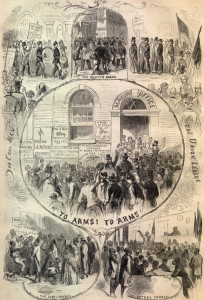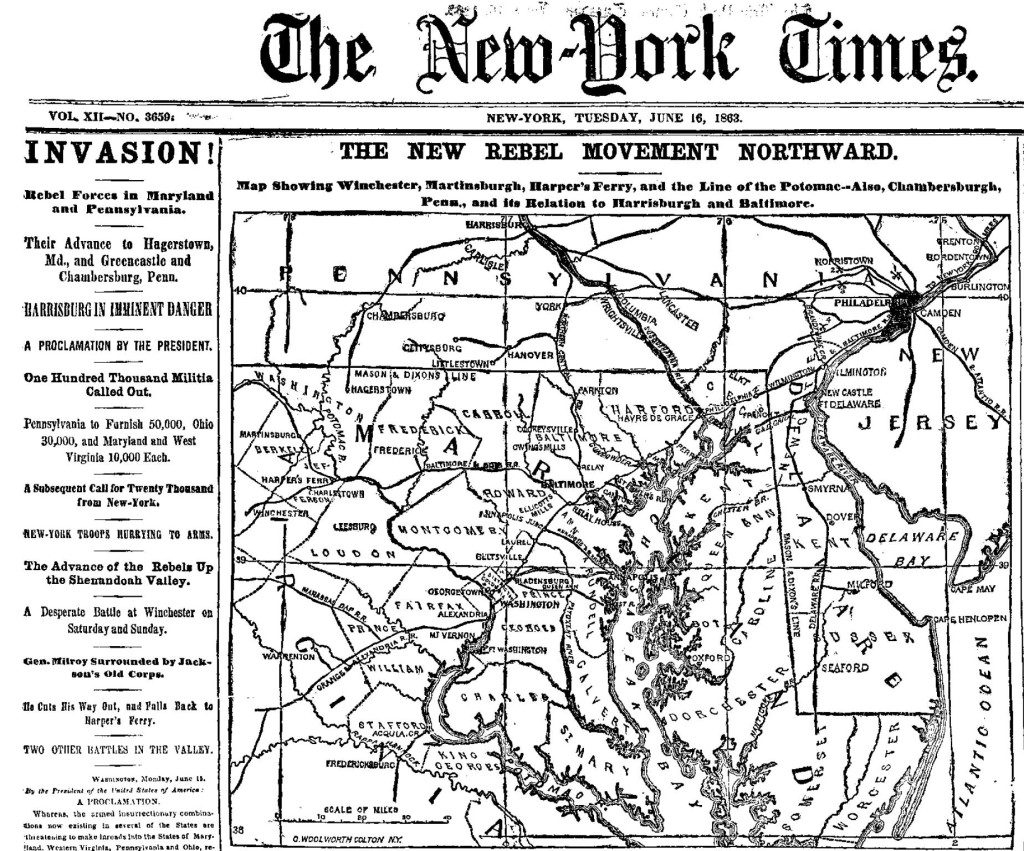As the Confederate Army of Northern Virginia moved northward, Harrisburg, Pennsylvania was the focal point for militia units from other Union states arriving to help shore up the Keystone state. The June 18, 1863 issue of The New York Times reported that Harrisburg was also receiving refugees from Chambersburg and Carlisle, PA. as rebel cavalry threatened. Philadelphia was also aroused.
From the Richmond Daily Dispatch June 22, 1863:
The excitement in Philadelphia — enrolling recruits — scenes at the Custom-House and Mayor’s office — desperate Efforts to Raise a force sufficient to repel the rebels.
The Philadelphia Inquirer, of the 18th, gives a description of the excitement caused there the day before by the rumors of the rebel advance. The greatest activity in military matters prevailed:
Drums and fifes could be heard in almost any direction, with music of a more expensive character. Large companies of men could be seen marching in every direction, at the tap of the drum, and there appeared to be the greatest enthusiasm pervading the entire community. The recruiting was lively, and large accessions were made to the ranks of the various regiments. In the morning, a company of colored men, under the following officers: Capt. Wm. Babe, 1st Lt. Wm. Elliott, 2d Lt. Thos. Moore, received orders for army equipments and transportation. They left in the afternoon. The 1st regiment Washington Brigade, commanded by Col. Wm. F. Small, had 500 names reported in the morning. A battery had also been formed by the sailors at the Navy- Yard, and their guns were shipped yesterday to Harrisburg. The First Ward is also raising a company to be commanded by Capt. Harvey. The 1st regiment of Grey Reserves will probably leave to-day. This regiment is commanded by Col. Chas. Smith.
Col. Wm. B. Mann, District Attorney, was very successful; he opened a recruiting station in the morning and by noon his company was full and accepted by Col. Ruff. They left yesterday afternoon for Harrisburg.
At the custom-house the most active preparations were being made. A table for recruiting purposes was placed in the middle of the spacious hall, also on the front portico, and recruits were enrolling with commendable rapidity. The employees and collector of the port, Col. W. B. Thomas, all appeared, in military caps, as though ready at any moment to march. The fine band of music provided for recruiting purposes returned occasionally throughout the day with persons anxious to enroll themselves for the defence of their country.
At the Mayor’s office a similar sight presented itself. There was one company of men belonging to the police department, composed of one hundred, that were ready for marching orders early in the day; they expect to leave the depot of the Reading railroad this morning. This company will be commanded by Captain Spear, Lieuts. Lievier and Jos. Patton.
The Keystone Artillery were ready, so far as numbers are concerned, yesterday morning, and designed leaving for Harrisburg in the evening. The GermantownHome Guard, under Captain Marks J. Biddle, were more than full yesterday morning, and left yesterday for the scene of action. A company, composed of employees belonging to the United States Mint, was accepted yesterday morning.
At a special meeting of the Board of Trustees of the Philadelphia Gas Works, yesterday, the following resolutions were adopted:
Resolved, That any of the employees of the Trust who shall respond to the call of the Governor for soldiers, will be allowed $1 per day, to be paid to their families or order, provided their services will not be required longer than one month, and their places will be reserved for them upon their return; and if absent in service for a longer period they will be allowed half that pay for an additional period not exceeding five months.
Resolved, That the superintendent of distribution be requested to suspend out-door work, in order to enable the employees in that branch of employment to respond to the call of the Governor in defence of the capital of the Commonwealth.
Perhaps there is no more stirring recruiting rendezvous in the city than is to be found in the marble structure on Chesnut street, above 4th, known as the Custom House. A strange contrast do the uniformed volunteers, reclining upon the steps, the flaming placards posted upon the corinthian columns, and the recruiting handbills adoring the walls, present to the peaceful avocations which are usually transacted within the marble walls. Recruiting officers are in attendance upon the outside and inside of the building. Blue jacketed sons of Uncle Sam blockade the entrance to the interior, and if a citizen steps within the precincts formerly dedicated to the reception of revenue duties and tariffs, he is instantly taken in charge by a file of sergeants, while the superior advantages of their respective companies are glowingly portrayed to the astonished civilian. The pursuits of the employees of the Custom House have been wonderfully changed within the past two or three days. Instead of the office coat and the long pen-handle projecting from the clustering hair which covers the ears of busy clerks, the bright blue uniforms of the United States volunteer forces are everywhere to be seen. The entries in the receipt books are neglected to give place to the handling of the sword and the manual of the rifle drill.
The Collector of the Port, Wm. B. Thomas, who has been so energetically engaged in perfecting the military organization of several regiments of civilians and Government employees, has full charge of the troops mustered in from the Custom-House attaches and from the recruits enrolled at the recruiting stations under the direction of that institution. He has made arrangements for the transportation of his regiment to Harrisburg to-day, and they are expected to leave this morning, fully eighteen hundred if not two thousand strong. The regiment was first started among the employees of the Custom-House. About two hundred and forty hands are connected with that building in the different departments, and out of these one hundred have signified their willingness to leave the city for State defence — Leave of absence has been procured from the Secretary of the Treasury, and he has commanded the men to march as soon as possible to the scenes of strife. Three companies from Montgomery county are expected to join this regiment, and the volunteers from Reading will most probably be incorporated with the command of Col. Thomas. By applying at the Custom House every information will be afforded to persons desirous of attaching themselves to the regiment, and a bounty of ten dollars will be paid to each recruit, in addition to a complete and perfect outfit, uniform, clothing, and equipments.
Seven companies of the Second Regiment Blue Reserves, in full ranks and equipped, will leave this morning for Harrisburg, under command of Lieut. Col. N. H. Graham. The remaining companies, under command of Col. W. W. Taylor, will follow in the evening.–This is among the first regiments that have responded to the call.
Thomas Nast’s Philadelphia drawing was published in the July 18, 1863 issue of Harper’s Weekly hosted at Son of the South. You can read a bit of description here.
The information is several undated “cuttings” (Hey, I’m used to that), so I’m not sure when the events happened. Frederick Douglass attended a meeting of black men. He wanted the other attendees to volunteer even though no one was sure if they’d be accepted:
Mr. Douglass urged immediate action. He said those present could enroll their names: if their services were not accepted, the responsibility would rest with the authorities. A number of persons then signed the roll. Another meeting is to be held this afternoon.


